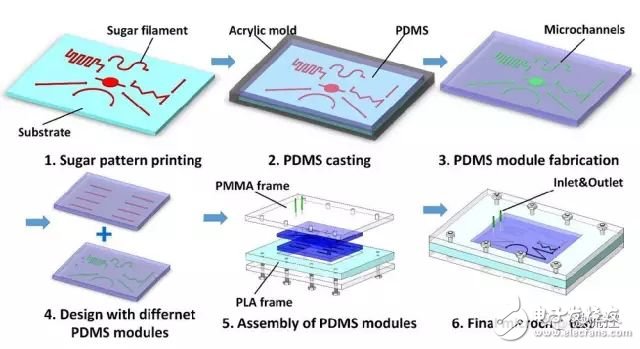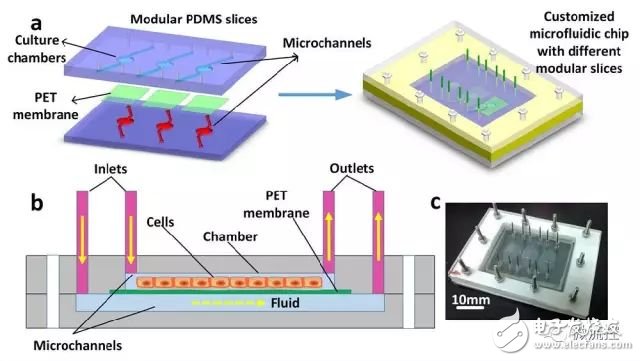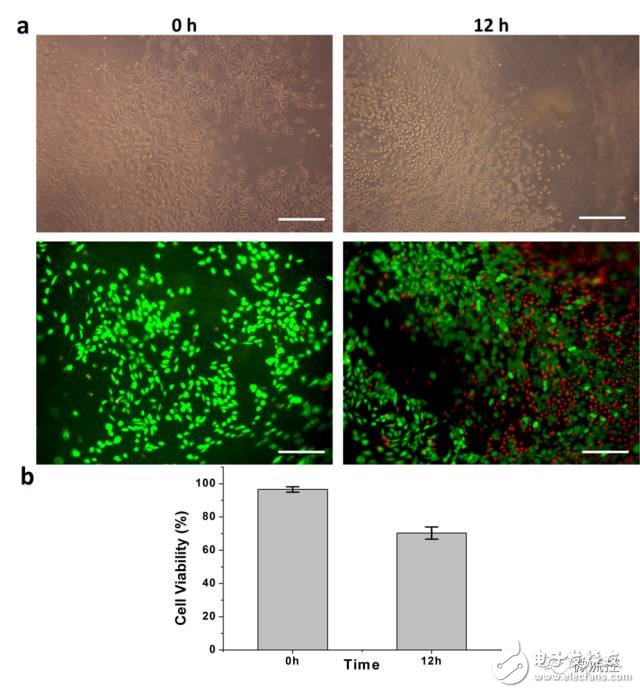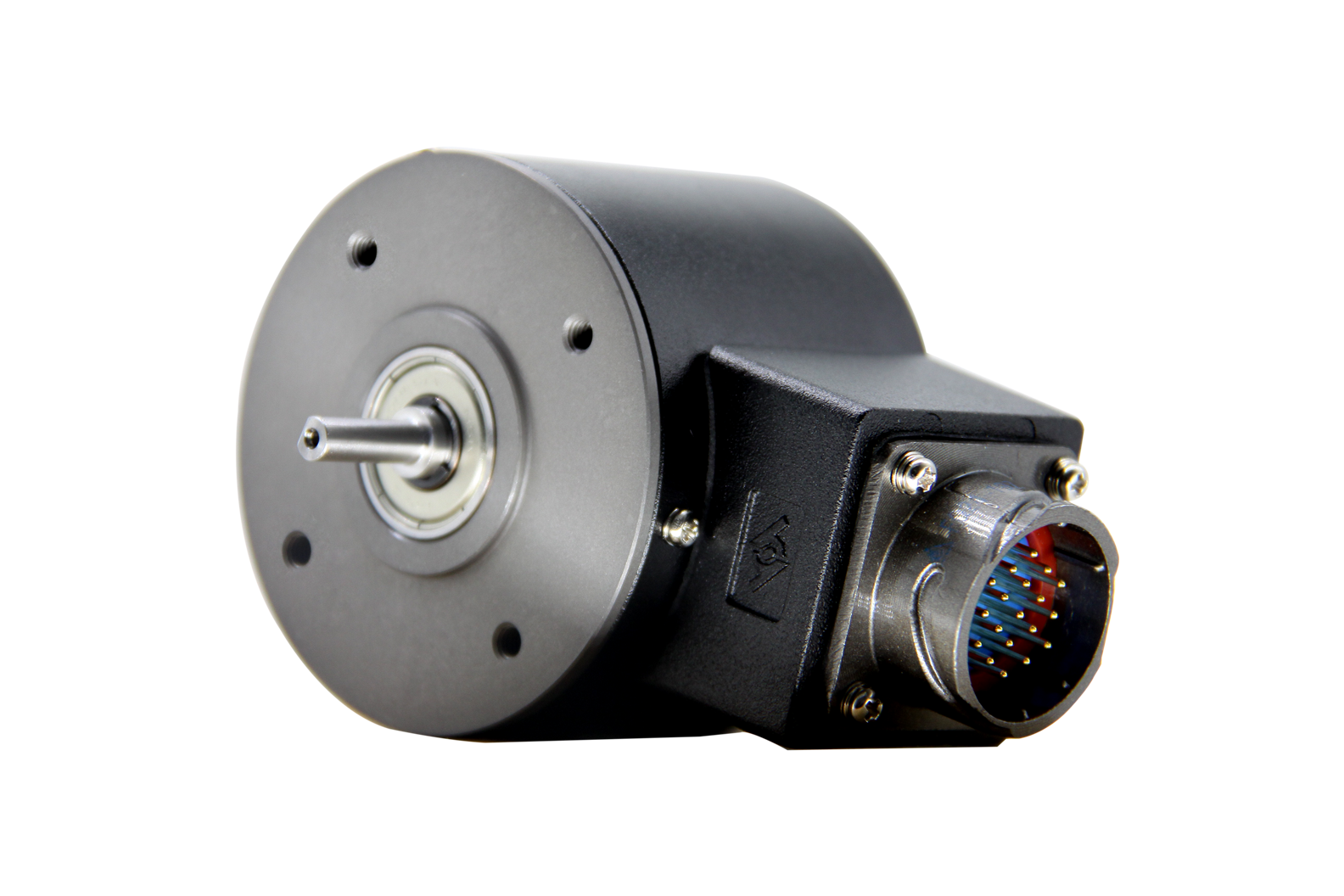As a platform for integrated sample preparation, detection analysis and cell culture in the fields of chemistry and biology, microfluidic chips have broad prospects in today's medical research. At present, the 3D microfluidic chip processing based on the traditional technology faces the problem of long processing cycle, high manufacturing cost, and single function of the chip. If the 3D microfluidic chip can be customized according to the experimental scheme in a short time, it will be a biological Medical research, especially in vitro microenvironment construction studies, provides an efficient tool. After more than two years of research and exploration, Professor He Yong and Professor Fu Jianzhong of Zhejiang University Key Laboratory of 3D Printing Technology and Equipment of Zhejiang University proposed a 3D microfluidic chip customization process based on modular structure design. The functional design of the microfluidic chip is rapidly manufactured. The process combines bio-manufacturing technology to rapidly manufacture organ chips, providing a viable solution for integrated simulation of different organs on subsequent chips. The research was funded by the National Fund Joint Fund-Zhejiang Dual Integration Key Project, the National Outstanding Youth Fund, and the Zhejiang Outstanding Youth Fund Project.
The manufacturing method of 3D microfluidic chip has been a research hotspot in the field of micromachining. Common methods include: traditional technology processing 2D structure stacking to get 3D chip, 3D printing technology to directly manufacture 3D microfluidic chip and pre-manufactured chip module assembly 3D chip. Although the 3D microfluidic chips manufactured by these methods can meet the experimental requirements to a certain extent, they cannot meet the requirements of biomaterial compatibility and rapid and simple chip manufacturing in medical research, so different experimental environments and experimental requirements are required. The structure and function of the 3D chip manufactured by these methods need to be continuously optimized and improved, affecting the culture and detection of cells and tissues in the chip, thereby prolonging the experimental period.
Our research group proposed a new 3D microfluidic chip manufacturing method, which is characterized by rapidly assembling chip modules according to experimental requirements, and realizing rapid reconstruction of 3D microfluidic chips under the premise of ensuring biocompatibility. Through the sugar printer developed by the research group in the early stage, the flow pattern was made by using the sugar extrusion nozzle, and the PDMS-based chip module was obtained by casting the PDMS after curing. According to the experimental requirements, the PDMS chip module with different functions, the flexible circuit, the biological bracket and other accessory components are integrated, and the fully functional 3D microfluidic chip is constructed by the technology of fast reversible packaging. Different function chip designs only need to replace modules with different functions according to the design. Through a large number of process experiments, the system solved the molding problem of PDMS module; the chip reconstruction experiment demonstrated the rapid customization of the chip based on functional design; and demonstrated the subsequent cell culture, cell oxidative stress damage and rapid construction of organ chips. The possibility of this method in biomedical applications.

Fast manufacturing schematic diagram of 3D microfluidic chip based on modular structure design

Rapid manufacturing of an integrated chip for biomedical applications

Rapid reconstruction of microfluidic chip based on functional design

Cell culture study in a fast custom chip

Study on Cellular Oxidative Stress Damage in Rapid Custom Chips

Rapid construction of organ chips
The results have been published in the ACS Biomaterials Science & Engineering journal of ACS under the title "Rapid Customization of 3D Integrated Microfluidic Chips via Modular Structure-Based Design", DOI: 10.1021/acsbiomaterials.7b00401.
Rotary encoders are used as sensors for angle,position,speed and acceleration. We can offer incremental encoders and absolute encoders.

Absolute Encoder,Custom Encoder On Motor,Custom Optical Encoders,High Resolution Encoder
Yuheng Optics Co., Ltd.(Changchun) , https://www.yhenoptics.com